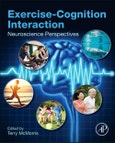Exercise-Cognition Interaction: Neuroscience Perspectives is the only book on the market that examines the neuroscientific correlation between exercise and cognitive functioning. The upsurge in research in recent years has confirmed that cognitive-psychology theory cannot account for the effects of exercise on cognition, and both acute and chronic exercise effect neurochemical and psychophysiological changes in the brain that, in turn, affect cognitive functioning.
This book provides an overview of the research into these effects, from theoretical research through current studies that emphasize neuroscientific theories and rationales. It addition, users will find a thorough examination of the effects of exercise interventions on cognitive functioning in special populations, including the elderly, children, and those suffering from a variety of diseases, including schizophrenia, diabetes, and an array of neurological disorders.
With contributions from leading researchers in the field, this book will be the go-to resource for neuroscientists, psychologists, medical professionals, and other researchers who need an understanding of the role exercise plays in cognitive functioning.
Please Note: This is an On Demand product, delivery may take up to 11 working days after payment has been received.
Table of Contents
1. History of Research into the Acute Exercise-Cognition Interaction2. History of Research into the Chronic Exercise-Cognition Interaction
3. Animal Models of the Exercise-Brain Interaction
4. Beyond the Catecholamines Hypothesis for an Acute Exercise-Cognition Interaction: A Neurochemical Perspective
5. Acute Exercise and Event-Related Potential: Current Status and Future Prospective
6. Acute Exercise and Cognition: Effects of Cerebral Oxygenation and Blood Flow
7. Reticular Activation Hypofrontality Theory
8. The Evidence for a Neurochemical Rationale for a Chronic Exercise-Cognition Interaction
9. The Chronic Exercise-Cognition Interaction: fMRI Research
10. The Chronic Exercise-Cognition Interaction: EEG Research
11. Effects of Fitness on the Exercise-Cognition Interaction
12. '"Cogito ergo sum" or "ambulo ergo sum"? New Perspectives in Developmental Exercise and Cognition Research
13. Acute Exercise and Cognition in Children and Adolescents: The Roles of Testosterone and Cortisol
14. The Chronic Exercise-Cognition Interaction in the Elderly
15. The Chronic Exercise-Cognition Interaction and Parkinson's Disease
16. The Chronic Exercise-Cognition Interaction and Dementia and Alzheimer's Disease
17. The Chronic Exercise-Cognition Interaction and Diabetes
18. The Chronic Exercise-Cognition Interaction and Attention Deficit Hyperactivity Disorder
19. The Chronic Exercise-Cognition Interaction and Breast Cancer Survivors
20. The Chronic Exercise-Cognition Interaction and Cardiovascular Risk Factors
21. The Chronic Exercise-Cognition Effect in Overweight and Obese Children
22. Exercise-Cognition Interaction: State of the Art and Future Research








